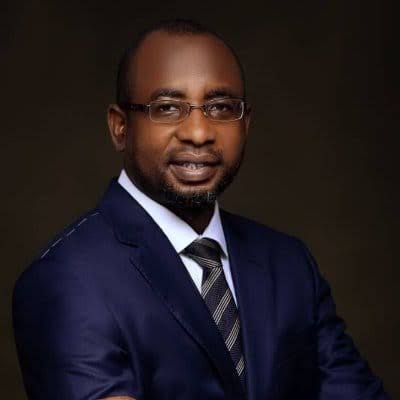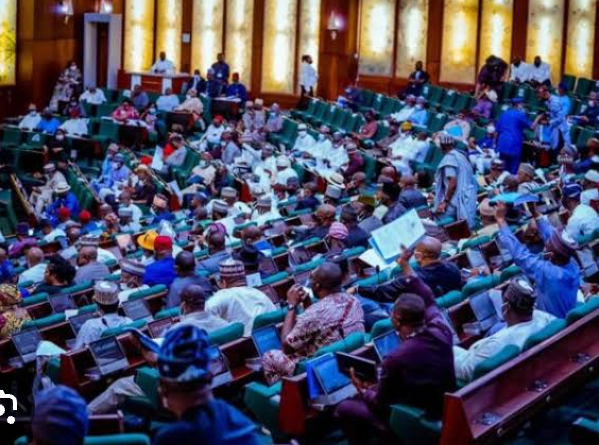News
CWAI Names NITDA As Dev’t, Regulatory Agency that Encapsulates Other Sectors

The National Information Technology Development Agency (NITDA) established by the NITDA Act of 2007 to regulate standards, guidelines and frameworks for the development and standardization of Information Technology practices in Nigeria, is also clamouring for the actualization of the Bill at the National Assembly for the last five years (since 2021).
The NITDA Bill, first proposed in 2021, seeks to repeal the National Information Technology Development Act No. 28 of 2007, and enact the National Information Technology Development Agency Act.
The amendments in the proposal include provisions for new license categorizations, licensing fees, 1% profit-before-tax levies for companies with revenues higher than 100 million naira, and prison sentences for defaulting parties.
In 2022, the Federal Executive Council (FEC) considered the Bill and moved a step further for its entry to the National Assembly. On December 23, 2022, at the National Assembly, a public hearing was held where stakeholders in Nigeria’s technology ecosystem weighed in on the Bill.

Since its announcement that year, the Bill has generated a healthy amount of controversy surrounding its purpose and compatibility with other technology-related bills, most notably the recently proposed startup bill.
Among the various submissions at the National Assembly are that Section 6(a) of the existing Act provides that NITDA is both a development and regulatory agency in the ICT sector.
However, the argument that NITDA is not a regulator was noted to be incorrect, and a total of thirty-one (31) stakeholders made submissions and presentations on the Bill. But out of this number, seventeen (17) were in support of the Bill, while fourteen (14) were opposed to it.
Those in favour based their support on the reason that the Bill provided for the development of the measures that would adequately regulate digital infrastructure, fast-track Nigeria’s transition into a leading digital economy, foster innovation and creativity, empower businesses in the country, improve the process of issuing and authenticating good character certificates and promote the use of technology in education and other sectors.
The Committee recommended to the Senate that the Bill be passed after considering the comments and opinions of stakeholders therein. The Bill states that the Senate Committee on ICT and Cyber Security was referred to as “A Bill for an Act to Repeal the National Information Technology Development Agency Act No. 28, 2007 and Enact the National Information Technology Development Agency Act to provide the Administration, Implementation and Regulation of Information Technology Systems and Practices, as well as the Digital Economy in Nigeria and for Related Matters, 2023 (SB1082), having considered the same, report favourably thereon recommended that the Senate pass the Bill as amended,” as stated in the Committee’s report during the second reading.
There was no time that the Bill was meant to usurp the powers of other regulators and make NITDA a super regulator in the ICT industry. A lot of stakeholders also said the Bill has the potential to reverse the gains delivered and made in the digital economy already. However, some stakeholders, on the other hand, agreed that the Bill has a lot of merit and that it would sanitize the industry and bridge the knowledge gap between Nigeria and other developed nations in digital economy.
The Citizens Watch Advocacy Initiative (CWAI), a civil society organization that champions accountability, good governance and transparency in Nigeria, believes that the Bill, if passed into law, has the enormous positive impact to the telecommunication and ICT industry in Nigeria, as it will ultimately lead to increase in the confidence of both local and international investors in the telecom and ICT sector of the Nigerian economy, thereby transforming the development agency to a regulator which will enhance the activities of other sectors concerned like the banking, financial services, insurance, healthcare, commerce education, agriculture, telecommunications, etc.
The role of NITDA under the proposed Act would have no direct conflicts with other regulators in the industry as being canvassed by naysayers. Accordingly, NITDA 2022 Bill will stabilize the regulatory environment in the telecom sector in Nigeria and attract the much needed foreign direct investments as well as domestic investments in the telecom and ICT sector in the country.
In a press release signed by the Executive Secretary of CWAI, Omoba Kenneth Aigbegbele, he asserted that from their investigation, the Bill seeks to enact an Act that will empower NITDA to provide for the administration, implementation and regulation of information technology systems and practice in Nigeria, which will automatically transform NITDA from a mere development agency to a regulatory agency in the sector that needs all the support, cooperation of Nigerians and stakeholders.
It is the first of its kind in the annals of history that will bridge the digital knowledge base of the country and impact the growth of the sector holistically in all spheres. The statement further added that the essence and purpose of the Bill is to create an effective, impartial, and independent regulatory framework for the development of the Nigerian information technology sector and digital economy.
Having been convinced about the proactive essence of the Bill, CWAI categorically states that the proposed NITDA Bill is focused on tax startups and in Part VI, Section 16, the Bill provides for the creation of the NITDA Fund, which will be used holistically for the “advancement of digital economy and related purposes,” and nothing more.
CWAI also notes that the skills deficit in human capital that hinders the country from thriving in the global digital economy would be overcome once and for all, as well as this would raise global digital competence in the country in the future, thereby expanding the service sector.
In view of this, CWAI enjoins the tech-ecosystem and techpreneurs to raise their voices and join the clarion call for all hands to be on deck for Nigeria to be able to achieve a large value chain that facilitates youth engagement, entrepreneurship development, the MSME development and women empowerment; which will provide and empower a rich, vibrant local industry of digital training providers with globally recognized standards attainable that can best compete anywhere. Therefore, recognizing and giving NITDA the required stakeholders’ support and engagement to drive this new initiative that will make the actualization of the Bill possible and acceptable to all.
CWAI therefore recognizes that NITDA has consistently driven an information technology policy that is geared towards the enhancement of Nigeria’s global acceptability and certification in the digital economy, where the country’s local, foreign partners and stakeholders are carried along in an effective, efficient and affordable value chain for the growth of the ICT sector and the telecom industry, creating and empowering Nigeria’s digital potentials and creating jobs for millions of youths in the country and the economic diversification for emerging technologies.
CWAI is holistically in support of NITDA’s drive, innovation, and ideas in the formulation of digital policies that will put Nigeria on the global arena and marketplace of the future. CWAI, therefore, advocates for NITDA’s regulatory status so as to accelerate other growing sectors of the economy.
News
Education Minister Urges NASS To Prioritise Takeoff Funding For Already Existing Institutions

By Gloria Ikibah
The Minister of Education, Dr. Olatunji Alausa, has called on the National Assembly to emphasise on funding for the effective take-off of already established institutions rather than creating new ones.
Dr. Alausa stated this at a public hearing organised by the House of Representatives Committee on Federal Polytechnics and Higher Technical Education, while presenting a memorandum on Thursday in Abuja.
The public hearing featured deliberations on three bills:
“A Bill for an Act to Establish the Federal College of Entrepreneurship and Skills Acquisition, Hawul Local Government Area, Borno State (HB.1797) – to provide full-time courses and training in technology, applied sciences, arts, social sciences, humanities, and management.
“A Bill to Amend Section 3(2)(b), the Second Schedule, and Section 31 of the Federal Polytechnics Act, Cap F17, Laws of the Federation of Nigeria, 2004 (HB.1413).
“A Bill to Amend the Federal Polytechnics Act, Cap F17, to review the functions of polytechnics (HB.2114)”.
The Minister speaking against the “Bill for an Act to Establish the Federal College of Entrepreneurship and Skills Acquisition, Hawul”, emphasised that the Federal Government maintains a policy of equitable distribution of federal institutions across states.
According to Alausa, no state should host more than one federal polytechnic, while every state must have at least one. Currently, all states except Sokoto and the Federal Capital Territory are covered under this arrangement.
He asserted that with limited resources, government efforts should be directed at strengthening existing institutions to deliver quality education rather than spreading resources thin by establishing new ones.
Alausa stated, “the Federal Ministry of Education has expanded avenues for establishing private tertiary institutions. States and individuals are encouraged to utilise these channels to support national educational development”.
In view of prevailing funding constraints, he recommended that deliberations on the proposed Federal College of Entrepreneurship and Skills Acquisition in Hawul, Borno State, be suspended.
He also urged the House to ensure that resources are dedicated to improving the quality of education for Nigerian students by consolidating support for already existing institutions.
With regards to the proposed amendments to the Federal Polytechnics Act, the minister raised no objections except for the provision seeking to include representatives of the National Board for Technical Education (NBTE) and the Manufacturers Association of Nigeria (MAN) on the Governing Council of Polytechnics.
“While both organisations play significant roles, their core functions do not directly align with the responsibilities of a polytechnic’s governing council. NBTE serves as a regulatory body, while MAN advocates for the interests of manufacturers”, he stated.
Earlier, the sponsor of the bill, Rep. Usman Balami (PDP–Borno), defended the proposal, citing insecurity and rising unemployment in Borno as pressing reasons for establishing the institution.
He described the proposed college as a strategic response to the growing number of unemployed youth and a means to equip them with skills necessary for self-reliance and economic empowerment.
“This institution will provide diverse training programmes tailored for today’s dynamic job market. It will bridge the gap between theory and practice, producing graduates ready to meet workforce demands”, Balami said.
According to the Borno lawmaker, the college will foster innovation, encourage entrepreneurship, and stimulate economic growth in the region by nurturing local talent and promoting a culture of self-employment.
Earlier in his remarks, the Committee Chairman, Rep. Fuad Laguda (APC–Lagos), noted a general consensus on the importance of skills acquisition in tackling unemployment.
He encouraged stakeholders to make robust contributions, assuring that the committee would carefully consider all submissions in its report.
“With the passage of these bills, Nigerians will have greater access to knowledge and skills in the arts, sciences, technology, humanities, and vocational and technical education,” Laguda said.
He also commended the leadership of the House for their support and the trust reposed in the committee to drive meaningful legislative outcomes.
News
Reps Resolve To Investigate Technical Glitch In 2025 UTME

By Gloria Ikibah
The House of Representatives has resolved to probe the technical fault that resulted in the widespread failure recorded in the 2025 Unified Tertiary Matriculation Examination (UTME).
This resolution was sequel to the adoption of a motion of urgent public importance by Rep. Adewale Adebayo, from Osun state on Thursday at plenary.
Naijablitznews.com recalled that the Joint Admissions and Matriculation Board (JAMB) had released the results of the 2025 UTME on May 9, with a significant number of candidates posting poor scores.
Reports further revealed that over 78 percent of candidates scored below 200 marks out of the total 400 obtainable.
Following a prompt internal review, JAMB identified a major technical fault behind the results.
The Registrar of JAMB, Prof. Ishaq Oloyede, at a press conference held on Wednesday in Abuja, stated that 379,997 candidates were affected due to discrepancies linked to server issues.
According to Prof. Oloyede, these was due to faulty software updates by one of the technical service providers handling JAMB’s operations in the Lagos and South-East zones.
He explained that the glitch, which occurred during the first three days of the examination, prevented the proper uploading of candidates’ answers and the error remained undetected before the results were made public.
He announced that the affected candidates will be allowed to retake the examination between May 16 and May 19, 2025.
Presenting the motion on the floor of the House, Rep. Adebayo lamented the hardships faced by many Nigerians, including long travels to exam centres, only to be met with such setbacks.
Contributing to the debate, Rep. Sada Soli from Katsina praised the JAMB Registrar for owning up to the error and offering an apology to the public, and described Oloyede as a man of integrity who has also improved the board’s finances since assuming office.
However, Speaker Tajudeen Abbas stated that whether the registrar deserves commendation is a matter for the investigative committee to determine.
The House also urged the federal government to establish Computer-Based Test (CBT) centres in all local government areas across the country.
Lawmakers also urged JAMB to release the results of candidates who are below the age of 16.
The House unanimously adopted the motion through a voice vote.
News
32.9kg cocaine trafficking: 10 Thai sailors, ship convicted, fined $4.3m(Photos)

. Conviction will send strong warning to int’l drug cartel, local collaborators, says Marwa, commends NDLEA officers for diligent investigation and prosecution
After over three years of diligent prosecution by the National Drug Law Enforcement Agency (NDLEA), a Federal High Court in Lagos presided over by Justice Daniel Osiagor has convicted 10 Thai sailors and their vessel named MV Chayanee Naree for trafficking 32.9 kilograms of cocaine from Brazil into Nigeria through the Apapa seaport, Lagos.
The convicted sailors who are all nationals of Thailand include: Krilerk Tanakhan; Boonlert Hansoongnern; Jakkarin Booncharoen; Thammarong Put-tlek; Worrapat Paopinta; Marut Kantaprom; Werapat Somboonying; Urkit Amsri; Panudet Jaisuk and Amrat Thawom.
They were first arraigned before the court along with nine Nigerian suspects by NDLEA in February 2022 on offences bordering on conspiracy and unlawful transportation of the illicit drug consignment from Brazil to Nigeria. The vessel, the convicted sailors and the nine Nigerians were arrested on 13th October 2021, at the Apapa port in Lagos. The Nigerian suspects are: Samuel Messiah; Ishaya Maisamari; Ilesanmi Ayo Abbey; Osabeye Stephen; Gbenga Ogunfadeke; Kayode Buletiri; Rilwan Omotosho Liasu; Saidi Sule Alani and Jamiu Adewale Yusuf.
They were all subsequently charged to court over the illegal acts which NDLEA prosecutors argued contravened sections 11(a), 11 (b), and 14 (b) of the National Drug Law Enforcement Agency Act Cap N30 Laws of the Federation of Nigeria, 2004, and punishable under the same Act.
The convicted sailors had initially made a no-case submission which was dismissed following submissions by the prosecution that a prima facie case had been established against the vessel and its crew members. As a result, the trial judge ordered the convicted Thai sailors and others to open their defence on the charges against them.
Following the court ruling, the convicted sailors opted for a plea bargain agreement with the NDLEA and as a result, Justice Osiagor delivered his ruling at the resumed hearing of the matter on Thursday 15th May 2025.
Among other penalties, the judge convicted the Vessel MV Chayanee Naree for unlawful transportation of 32.9kg of cocaine into Nigeria and
ordered to pay a fine of $4 million or its Naira equivalent.
The 2nd – 11th defendants were convicted under section 25 of the NDLEA Act for permitting the use of the vessel for the unlawful transportation of 32.9kg of cocaine, while the 2nd, 3rd and 4th defendants were ordered to pay N100,000.00 each as punishment for the offence and in addition restitution in the sum of $50,000 USD each or its equivalent in Naira to the Federal Government of Nigeria. The 5th – 11th defendants are to pay N100,000.00 each and restitution in the sum of $30,000.00, bringing the total amount payable to Four Million Three Hundred and Sixty Thousand US Dollars ($4,360,000.00).
Justice Osiagor thereafter adjourned the trial of the nine Nigerian suspects to June 25.
While the prosecution was led by the Agency’s Director of Prosecution and Legal Services, DCGN Theresa Asuquo, supported by A. Adebayo and Paul Awogbuyi, the defence team was led by the trio of Messrs Babajide Koku, Femi Atoyebi and Tunde Adejuyigbe, all Senior Advocates of Nigeria (SAN).
In his reaction, Chairman/Chief Executive of NDLEA, Brig Gen Mohamed Buba Marwa (Rtd) said the court ruling was a strong message to the international drug cartel and their local collaborators that Nigeria will never be a safe hub for illicit drug trafficking. He commended the NDLEA prosecution team and officers of the Apapa Strategic Command involved in the arrest, seizure and investigation of the shipment for their diligence and resilience in following the case to a logical conclusion. He charged them not to relent in pursuing the other part of the case still pending.
-

 News20 hours ago
News20 hours agoTinubu Endorses Establishment of Forest Guards to Counter Terrorism, Banditry
-

 Opinion13 hours ago
Opinion13 hours agoHuman Capital Devt: The Rep Paul Nnamchi
-

 News8 hours ago
News8 hours agoAlleged cyber bullying: IGP re-arraigns VDM
-

 News20 hours ago
News20 hours agoNNPCL failed to remit N500bn revenue in 2024 – World Bank
-

 News20 hours ago
News20 hours agoFG launches smart police station in Abuja
-

 News9 hours ago
News9 hours agoBREAKING: PDP, NNPP Rep members abandon parties, lace boots with APC
-

 News13 hours ago
News13 hours agoSEE Current Black Market Dollar (USD) To Naira (NGN) Exchange Rate
-

 News13 hours ago
News13 hours agoNnamdi Kanu’s family wants court to ban NAN coverage of son’s trial or allow live streaming









